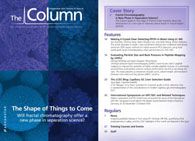International Symposium on GPC/SEC and Related Techniques
Waters Corporation and PSS GmbH have announced the return of the International GPC/SEC Symposium to be held at The Westin Grand Frankfurt Hotel in Frankfurt, Germany, on 30 September–2 October 2014.
Waters Corporation and PSS GmbH have announced the return of the International GPC/SEC Symposium to be held at The Westin Grand Frankfurt Hotel in Frankfurt, Germany, on 30 September–2 October 2014.
During the 1990s, the symposium was a highly regarded event on the conference calendar, bringing together some of the world's foremost research and applications scientists to provide a forum for the free exchange of information related to polymer and additive analysis.

(PHOTO CREDIT: GUY VANDERELST/GETTY IMAGES)
The conference will begin with a Meet the Expert Day on 30 September. A visiting panel of leading polymer scientists will present and discuss a subject of particular interest within their field of expertise. The panel includes: Gabriel Vivo-Truyols (University of Amsterdam, The Netherlands), Bastiaan Staal (BASF, Ludwigshafen, Germany), Harald Pasch (University of Stellenbosch, South Africa), Peter Schoenmakers (University of Amsterdam, The Netherlands), Yefim Brun (DuPont Central Research & Development, USA), Scott Hanton (Intertek, USA), and André M. Striegel (NIST, USA).
This will be followed by the main conference consisting of two days of short presentations and interactive workshop discussions on topics selected by the expert panel. Session topics include: GPC/SEC potential and limitations; GPC/SEC applications using viscometry and light scattering techniques; GPC/SEC applications using mass spectrometry, NMR, and FTIR; fractionation techniques (GPC/SEC, SFC, LAC, FFF, CE); hyphenated fractionation and multi-dimensional techniques; new stationary phases for LC/SEC; and high throughput process research, development, and control.
Registered symposium attendees are invited to submit a current analytical problem or application issue through the symposium website. The organizing committee will review all submissions and choose four of these to be discussed during a special workshop session entitled "Wisdom of the Crowd". This unique session will provide a great opportunity to leverage the experience of our attendees to help solve real world challenges.
E-mail: Suzanne_carlson@waters.com
Website: gpcevent.com
This article is from The Column. The full issue can be found here:http://images2.advanstar.com/PixelMags/lctc/digitaledition/September08-2014-uk.html#2


















Regulatory Deadlines and Supply Chain Challenges Take Center Stage in Nitrosamine Discussion
April 10th 2025During an LCGC International peer exchange, Aloka Srinivasan, Mayank Bhanti, and Amber Burch discussed the regulatory deadlines and supply chain challenges that come with nitrosamine analysis.
Regulatory Deadlines and Supply Chain Challenges Take Center Stage in Nitrosamine Discussion
April 10th 2025During an LCGC International peer exchange, Aloka Srinivasan, Mayank Bhanti, and Amber Burch discussed the regulatory deadlines and supply chain challenges that come with nitrosamine analysis.
